人教版高中英语选修6Unit 1 Art Grammar课件(66张ppt)
文档属性
| 名称 | 人教版高中英语选修6Unit 1 Art Grammar课件(66张ppt) | 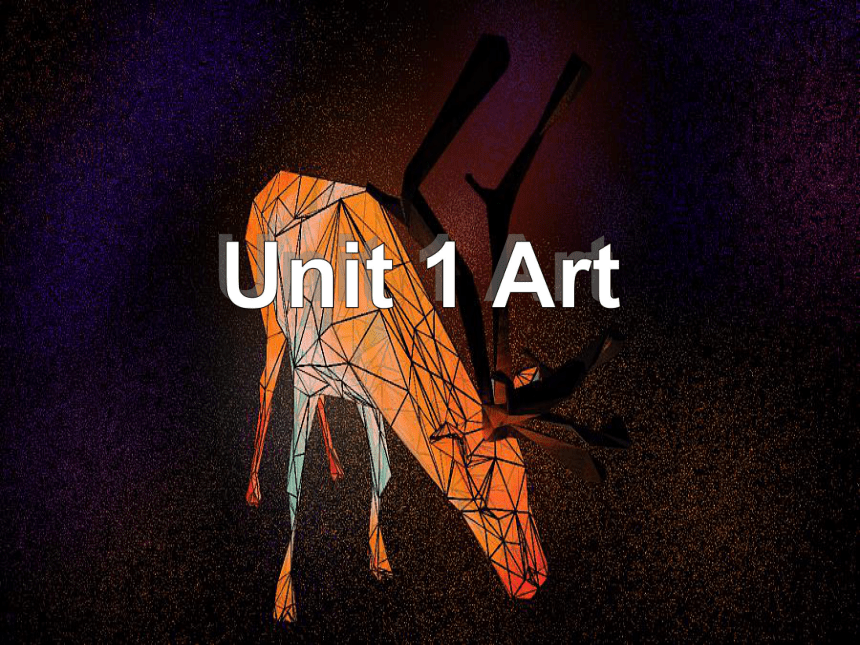 | |
| 格式 | ppt | ||
| 文件大小 | 3.3MB | ||
| 资源类型 | 教案 | ||
| 版本资源 | 人教版(新课程标准) | ||
| 科目 | 英语 | ||
| 更新时间 | 2020-07-22 08:38:32 | ||
图片预览

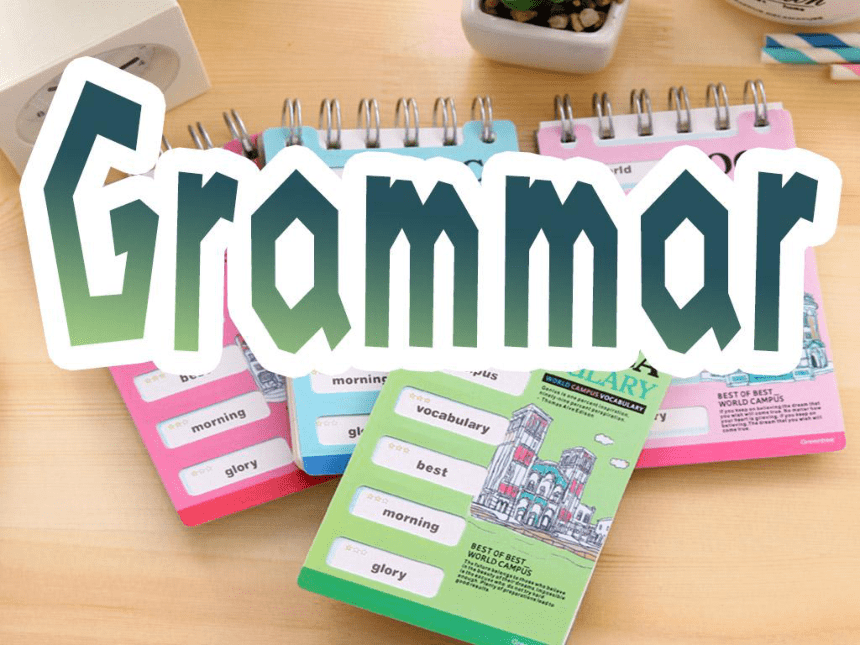
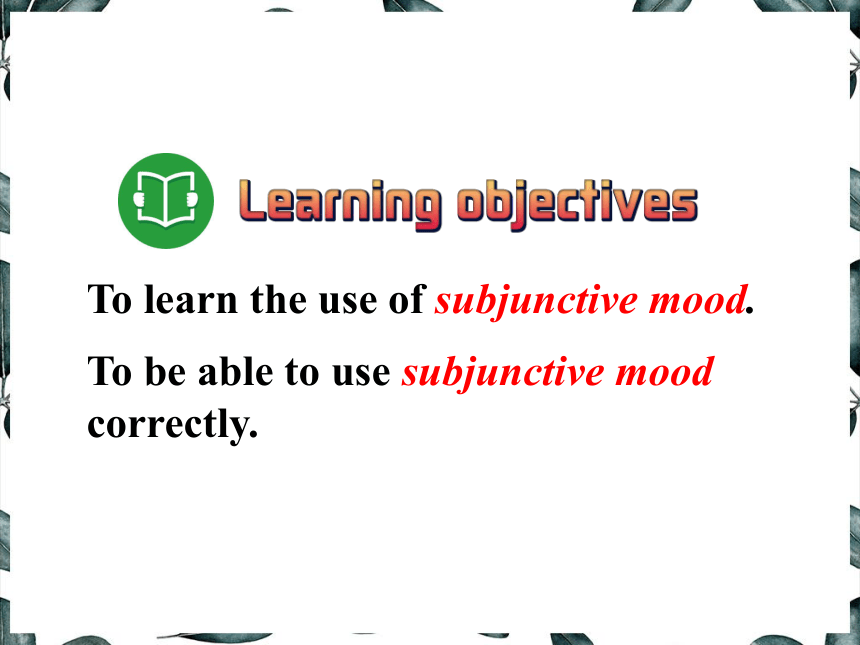
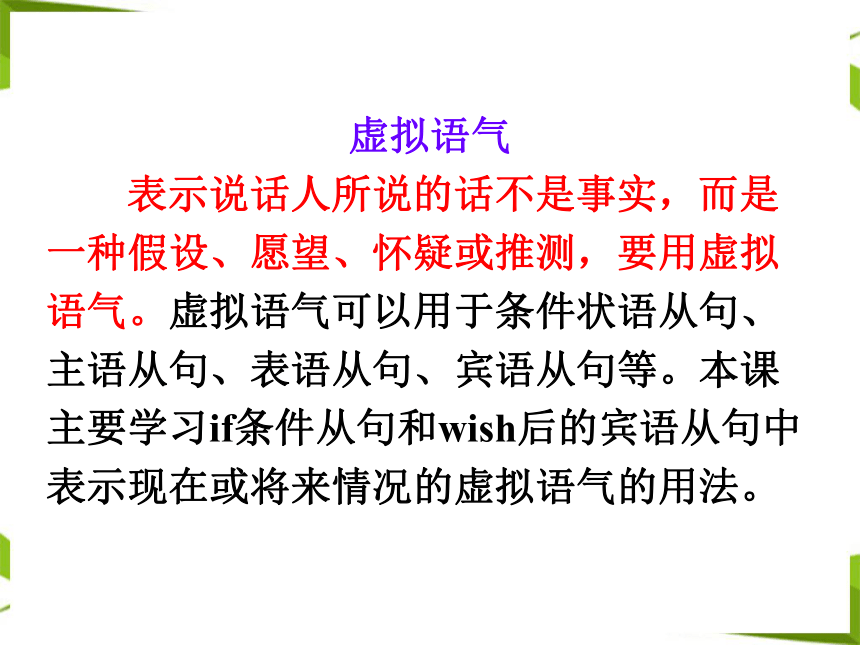

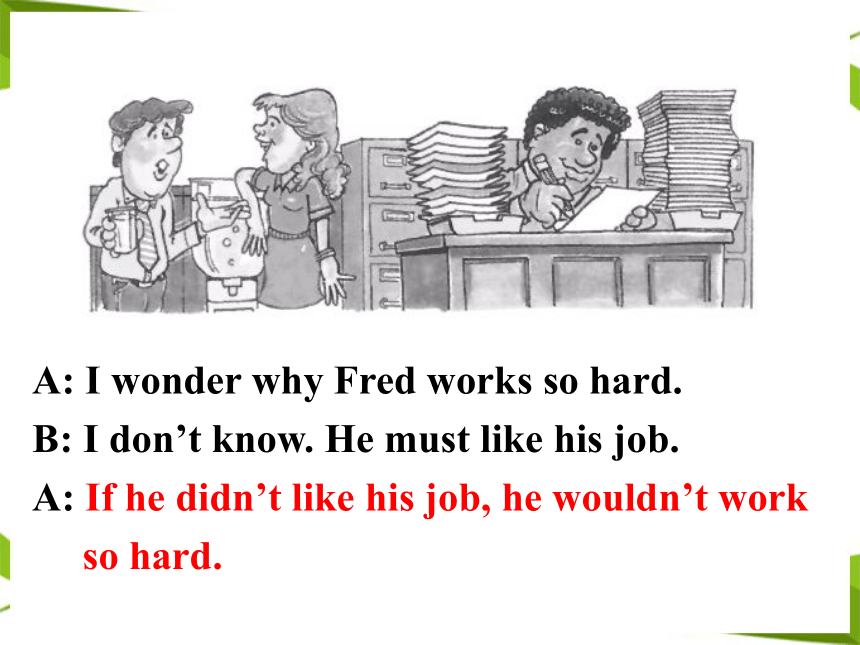
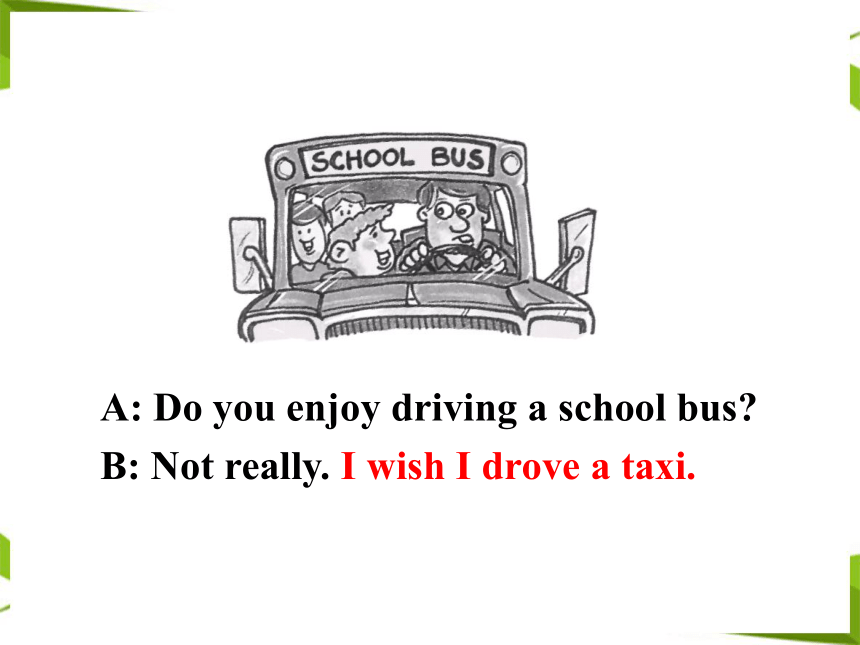
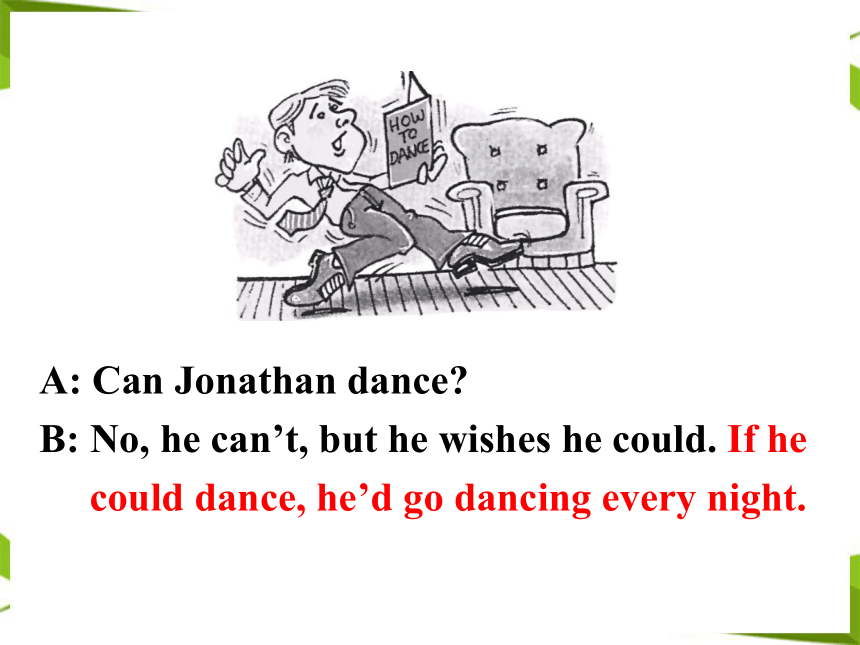
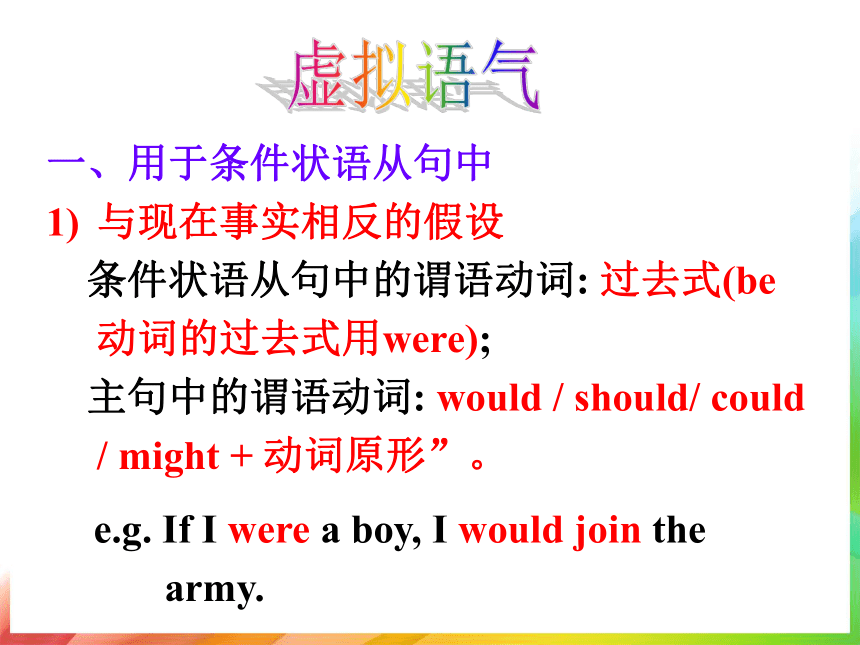
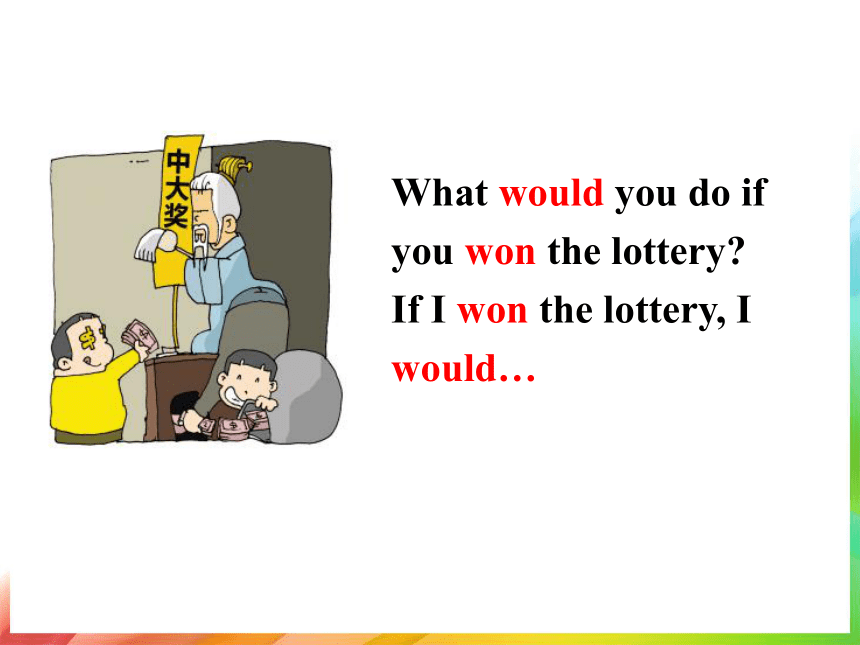
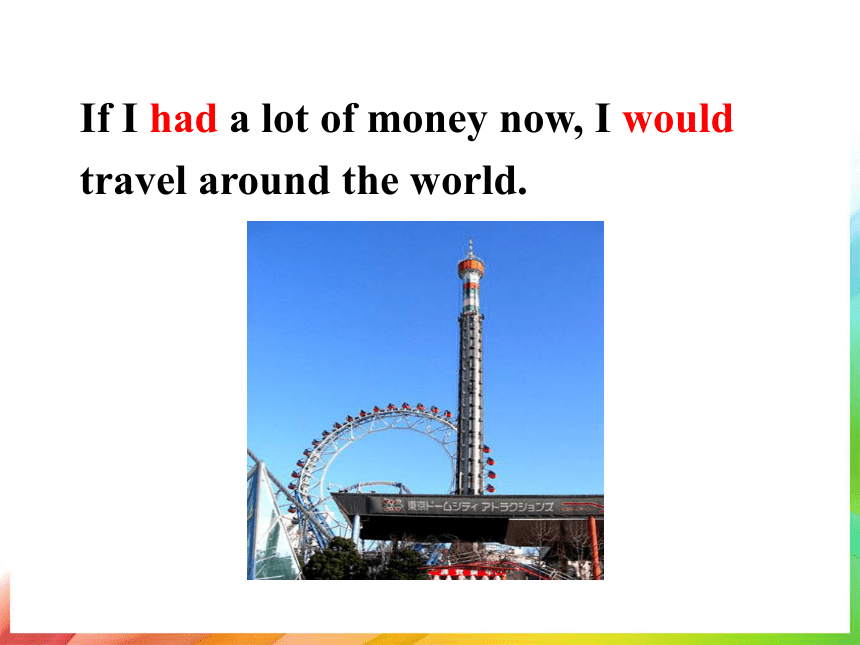
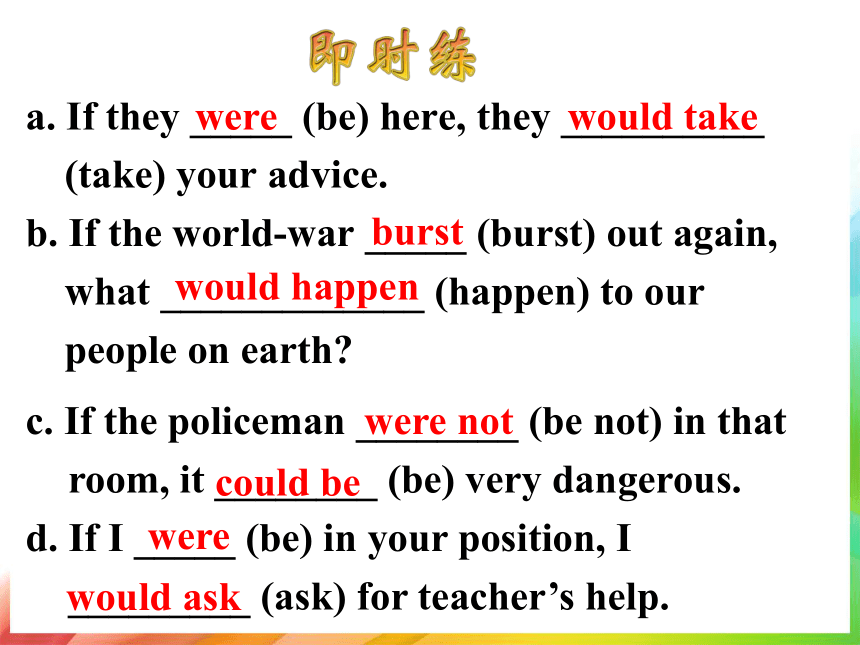
文档简介
To learn the use of subjunctive mood.
To be able to use subjunctive mood correctly.
虚拟语气
表示说话人所说的话不是事实,而是一种假设、愿望、怀疑或推测,要用虚拟语气。虚拟语气可以用于条件状语从句、主语从句、表语从句、宾语从句等。本课主要学习if条件从句和wish后的宾语从句中表示现在或将来情况的虚拟语气的用法。
观看下图及对话,体会表示现在的虚拟语气的用法。
A: Why don’t our grandchildren visit us
more often?
B: They don’t have enough time. If they
had more time, they’d visit us more
often.
A: I wonder why Fred works so hard.
B: I don’t know. He must like his job.
A: If he didn’t like his job, he wouldn’t work so hard.
A: Do you enjoy driving a school bus?
B: Not really. I wish I drove a taxi.
A: Can Jonathan dance?
B: No, he can’t, but he wishes he could. If he could dance, he’d go dancing every night.
一、用于条件状语从句中
与现在事实相反的假设
条件状语从句中的谓语动词: 过去式(be 动词的过去式用were);
主句中的谓语动词: would / should/ could / might + 动词原形”。
e.g. If I were a boy, I would join the
army.
What would you do if you won the lottery?
If I won the lottery, I would…
If I had a lot of money now, I would travel around the world.
a. If they _____ (be) here, they __________ (take) your advice.
b. If the world-war _____ (burst) out again, what _____________ (happen) to our people on earth?
were
would take
burst
would happen
c. If the policeman ________ (be not) in that room, it ________ (be) very dangerous.
d. If I _____ (be) in your position, I _________ (ask) for teacher’s help.
were not
could be
were
would ask
Discuss the topic in groups.
You had a dream that you were a teacher.
What would you do if you were a
teacher?
If I _____ a teacher, I would …
were
2) 与过去事实相反
从句的谓语动词:had+过去分词;
主句的谓语动词:should(第一人称)/would (第二、三人称) / could / might have +动词过去分词。
If he __________ more carefully, he _________________ the car accident yesterday.
had driven
would not have had
If I __________ how to swim,
I __________________ trapped in this island.
had learnt
would not have been
a. If Tom ________ (be) more careful in the exam, he ________________ (pass) it already.
b. If you _______ (get) up earlier, you ________________ (catch) the first train.
had been
would have passed
had got
would have caught
c. If I ________ (meet) you yesterday, we _______________ (go) to the concert together.
had met
would have gone
Solve problems
A student failed the English exam. Could
you give him some suggestions?
3) 与将来事实相反
从句的谓语动词:动词过去式或 were to do 或should do 形式;
主句谓语动词:should(第一人称) /would (第二、三人称) /could/ might +动词原形。
e.g. If you succeeded, everything would be all right.
If you should succeed, everything would be all right.
If you were to succeed, everything would be all right.
If he got up early,
he would be on time.
假如他来了, 我们对他说什么呢?
If he were to come, what should we say to him?
假如他看见我, 就会认识我。
If he should see me, he would know me.
a. If there _________ (be) no natural resource any more, we _____________ (make) use of nuclear power.
b. What _____________ (happen) if you _____________ (get up) too late tomorrow?
should be
should make
would happen
should get up
c. If Robots ______________ (control) the world some day, here _________ (be) no friendship.
were to control
would be
主句与从句的动作发生在不同的时间, 这时主从句谓语动词的虚拟语气形式因时间不同而不同, 这叫做混合条件句。
e.g. If you had asked him yesterday, you
would know what to do now.
例句中从句与过去事实相反, 主句与现
在事实相反。
If the staff had been more careful,
the mall would not be on fire now.
条件从句
If 从句的谓语形式
主句的谓语形式
现在
过去时(were)
would/could/should/might +v. (原)
虚拟语气在条件状语从句中的用法。
条件从句
If 从句的谓语形式
主句的谓语形式
过去
未来
过去完成时
would/could/should/might + have + p.p.
1. 过去时
2. should + v.
3. were to do
would/could/ should/ might + v. (原)
二、在宾语从句中的用法
1. 在动词wish后的宾语从句中, 表示与现在或过去的事实相反, 或对将来的主观愿望, 从句通常省略连词that。
1) 对现在情况的虚拟: 从句动词用过去式或过去进行式 (be动词一般用were) 。
e.g. I wish I were as tall as you.
I wish every day were my birthday.
2) 对过去情况虚拟: 从句动词常用had+过去分词。
e.g. I wish/wished I hadn’t eaten
so much watermelon.
The party was terrible, I wish I had never gone to it.
3) 对将来的主观愿望: 从句动词形式为 would/ could/ might+动词原形。
注意:
主句的主语与从句的主语不能相同,因为主句的主语所期望的从句动作能否实现,取决于从句主语的态度或意愿(非动物名词除外)。
e.g. 但愿你立刻来。
I wish you would come soon.
2. 表示要求,命令,建议的虚拟语气。
一个坚持,两个命令,三个建议,四个要求。这些动词后面的宾语从句要使用虚拟语气。should+动词原形,或将should省略。
1. insist 2. order, command
3. advise, suggest, propose
4. demand, require, request, desire
e.g. 我们建议汤姆去休息一下。
We suggested that Tom (should) have
a rest.
He insisted that I (should) be present.
他坚决要求我到场。
国王命令囚犯明天要实施死刑。
他们要求我们派他们去那儿工作。
The king ordered that the prisoners
(should) be killed the next day.
They requested that we (should) send
them to work there.
以上动词相应的名词构成的名词性从
句包括主语从句,表语从句和同位语从句也要使用虚拟语气。从句中的动词形式一样。 (should)+v.
order, advice, suggestion, proposal,
demand, request, desire
e.g. It’s suggested that the plan be carried out.
My demand is that she should come to see me once a week.
All of us are for the advice that the chemical factory should be closed down.
insist / suggest 不接虚拟的用法
e.g. She insisted that she was right.
她坚持认为自己是对的。
(坚持事实)
His uncle insists that he should not stay in the hotel.
他的叔叔坚持要求他不要待在旅馆里。
e.g. The look on his face suggested that
he was unhappy.
I suggested that the teachers’ wages (should) be increased.
3. It’s (about/high) time +
(that)…
e.g. 你该走了。
It’s time that you went.
It’s time that you should go.
(should不可省略)
should +v.
过去时
我们该去睡觉了。
It’s time that we went to bed.
It’s time that we should go to bed.
as if/as though
由as if (as though)或even though (even though) 引导的状语从句表比较或方式时, 从句谓语动词:过去式 (be用were)或“had+过去分词”。
e.g. He behaves as if he owned the house.
She talks about Rome as though she had been there herself.
他那样对待我, 好像我是陌生人似的。
He treats me as if I were a stranger.
注意:
如果表示的事情可能会发生, 那么方式状语从句中的谓语动词可用陈述语气。
Even if she were here, she could not solve the problem.
4. would rather (that)
现在:
过去:
将来:
e.g. I would rather you paid me now.
I would rather you had gone, too.
Don’t come. I would rather you came tomorrow.
过去时
过去时
过去完成时
(2017 江苏) ______ (be) it not for the support of the teachers, the student could not overcome her difficulty.
2.(2018江苏卷)There is a good social
life in the village, and I wish I _______ a
second chance to become more involved.
Were
had
3.(2018天津3月)Jane wishes that she
___________ (study) foreign trade instead of literature when she was in college.
had studied
Read the following sentences carefully. Write F if the sentence refers to a factual situation, and write W if it refers to a wish.
He would come to the party if he did not
have to work.
= He wants to come, but he cannot just
because he has to work.
W
2. If he has time, he always walks into the café and asks for a cup of coffee.
= He always walks into the café and asks for a cup of coffee when he has time.
3. If I had enough money I would buy a new car.
4. I'll go with you to the gallery if it doesn’t rain tomorrow.
F
W
F
Change the following statements into
wishes.
5. He has no right to choose his holiday, so he can’t go to Mexico.
If he had right to choose his holiday, he would go to Mexico.
6. I can’t eat shellfish because I am allergic to them.
If I were not allergic to shellfish, I would enjoy eating them.
7. As the marble statue is too large for her harden, the housewife won’t buy it.
If the marble statue were not too big for her garden, the housewife would but it.
8. We know very little about the disease, so we are not able to treat the patients very effectively.
If we knew more about the disease, we would be able to treat the patients very effectively.
Complete the sentences with the
correct form of the verbs in brackets.
1. David is not a sculptor. If he _____, he ___________ (make) a sculpture for the exhibition.
2. Sally is not an aggressive person. If she ______ (be), she ________ (be) a more successful business woman.
were
would make
were
would be
3. If Sam _____ (be) here, he ________ (be) so excited about meeting a famous scholar in the flesh.
4. If I _____ (can) paint, I ___________ (paint) you an abstract painting in the style of Matisse.
5. Mr Ling isn’t here. If he _____ (be), he _________ (help) you with your geometry.
were
would be
could
would paint
were
would help
6. It’s Miss Liang’s birthday today. I wish I _________ (take) her out to a superb restaurant for dinner.
7. We don’t know her address. If we _____ (know) it, we __________ (send) her a big bunch of flowers.
8. People say that the art exhibition is worth seeing. I wish I _______ (can) go with you but I’m too busy these days.
could take
knew
would send
could go
9. If Masaccio _____ (be) alive, he _______ (be) amazed at how artists paint today.
10. If Peter ___________ (come) to our school, he ______ (can) go to our art classes.
were
would be
would come
could
用括号内动词的正确形式填空。
1. The soup isn’t very good. It _________________________________ (taste) better if it weren’t so salty.?
2. A: Is Ken going to take the examination?
B: No. If he took the examination, he ________________________________ (fail).
would / could / should / might taste
would / could / should / might fail
3. The weather was cold while we were away. I wish it __________ (be) warmer.
4. She is out. I wish that she ________ (be) here with me now.
had been
were?
1. 什么是虚拟语气。
2. 虚拟语气(和现在、过去、将来事
实相反)的用法。
Ⅰ.用动词的正确形式完成下面对话。
Michael: Sharon, I am having some problems
at work, and I was wondering if you
might be able to give me some advice.
Sharon: Sure, what’s the problem?
Michael: I wish I 1. ___________ (choose) a
different career. Selling computers
is more difficult than I thought.
had chosen
Most computer users don’t need a very
advanced computer; they just need a
basic model which they can use for
word-processing, bookkeeping and
Internet access. If a customer 2.
________ (ask) me to suggest a model, I
am usually quite honest and recommend
one of the cheaper models.
Sharon: You are right to do that.
asks
Michael: But my boss gets angry with me. He
always says that a good salesperson
can convince a customer to buy one
of the more expensive advanced
models. When I sell an inexpensive
computer to a customer, my boss 3.
__________ (complain) that I am
not trying hard enough.
complains
Sharon: If?I?4. ________?(be)?in?your?shoes,?I
5. ____________________________
(tell) him that I wasn’t comfortable
forcing customers to buy products they
didn’t need and that I wanted to
provide them with good service.
Usually, if customers got good service,
they 6.
_________________________________
(return) to the store and spend more
money.
were
would / should / could / might tell
would / should / could / might return
Michael: I think that’s a great idea. He 7.
_______________________________
(change) his mind if I said that to him.
I wish he 8. ______________________
(realize) that good service was the
most important thing to consumers.
Thanks for your advice.
would / could / might realize
would / should / could / might change
Ⅱ.用括号内动词的正确形式填空。
1. I can’t decide what to do. What would you do if you ________ (be) in my situation?
2. It’s a difficult question. I wish I __________________________ (know) the answer tomorrow.
were
would / could / might know
3. A: Shall we catch the 10:30 train? ??
B: No. If we ____________________________ (catch) it, we would arrive too early.
4. I should have listened to you. I wish I ___________ (take) your advice.
5. When we were in London last year, we didn’t have time to see all the things we wanted to see. I wish we __________ (have) more time.
caught / were to catch / should
had taken
had had?
III. 改写下面句子,使每组句子意思相同或相近。
1. Liz is tired all the time. She shouldn’t have gone to bed so late.
If Liz hadn’t gone to bed so late, she ________________________________________________________________.
wouldn’t / couldn’t / shouldn’t / mightn’t be tired all the time
2. I don’t want them to be upset, so I’ve decided not to tell them what happened.
They ________________________________ if I were to tell them what happened.
3. It’s rather late. I don’t think Ann will come to see us now.
I’d be surprised if Ann _______________________.
would / could / might / should be upset
came to see us now
4. Many students leave their bikes unlocked in the college yard. This makes life easy for thieves.
If students ____________________________, _______________________ life wouldn’t be easy for thieves.
5. Flying to Scotland is cheaper than going by rail. As a result, people go there by plane.
If flying to Scotland __________________ than going by rail, people wouldn’t go there by plane.
didn’t leave their bikes unlocked
weren’t cheaper
in the college yard
Translate the following sentences, using the sentence pattern “If I were you”.
1) 我要是你的话, 我就会把英语学好。
2) 如果你昨天来, 你就会看见他。
3) 万一明天下雨, 我们就不到那儿去。
4) 我希望我十年前认识他。
5) 他对待我就像对待他自己的儿子一样。
To be able to use subjunctive mood correctly.
虚拟语气
表示说话人所说的话不是事实,而是一种假设、愿望、怀疑或推测,要用虚拟语气。虚拟语气可以用于条件状语从句、主语从句、表语从句、宾语从句等。本课主要学习if条件从句和wish后的宾语从句中表示现在或将来情况的虚拟语气的用法。
观看下图及对话,体会表示现在的虚拟语气的用法。
A: Why don’t our grandchildren visit us
more often?
B: They don’t have enough time. If they
had more time, they’d visit us more
often.
A: I wonder why Fred works so hard.
B: I don’t know. He must like his job.
A: If he didn’t like his job, he wouldn’t work so hard.
A: Do you enjoy driving a school bus?
B: Not really. I wish I drove a taxi.
A: Can Jonathan dance?
B: No, he can’t, but he wishes he could. If he could dance, he’d go dancing every night.
一、用于条件状语从句中
与现在事实相反的假设
条件状语从句中的谓语动词: 过去式(be 动词的过去式用were);
主句中的谓语动词: would / should/ could / might + 动词原形”。
e.g. If I were a boy, I would join the
army.
What would you do if you won the lottery?
If I won the lottery, I would…
If I had a lot of money now, I would travel around the world.
a. If they _____ (be) here, they __________ (take) your advice.
b. If the world-war _____ (burst) out again, what _____________ (happen) to our people on earth?
were
would take
burst
would happen
c. If the policeman ________ (be not) in that room, it ________ (be) very dangerous.
d. If I _____ (be) in your position, I _________ (ask) for teacher’s help.
were not
could be
were
would ask
Discuss the topic in groups.
You had a dream that you were a teacher.
What would you do if you were a
teacher?
If I _____ a teacher, I would …
were
2) 与过去事实相反
从句的谓语动词:had+过去分词;
主句的谓语动词:should(第一人称)/would (第二、三人称) / could / might have +动词过去分词。
If he __________ more carefully, he _________________ the car accident yesterday.
had driven
would not have had
If I __________ how to swim,
I __________________ trapped in this island.
had learnt
would not have been
a. If Tom ________ (be) more careful in the exam, he ________________ (pass) it already.
b. If you _______ (get) up earlier, you ________________ (catch) the first train.
had been
would have passed
had got
would have caught
c. If I ________ (meet) you yesterday, we _______________ (go) to the concert together.
had met
would have gone
Solve problems
A student failed the English exam. Could
you give him some suggestions?
3) 与将来事实相反
从句的谓语动词:动词过去式或 were to do 或should do 形式;
主句谓语动词:should(第一人称) /would (第二、三人称) /could/ might +动词原形。
e.g. If you succeeded, everything would be all right.
If you should succeed, everything would be all right.
If you were to succeed, everything would be all right.
If he got up early,
he would be on time.
假如他来了, 我们对他说什么呢?
If he were to come, what should we say to him?
假如他看见我, 就会认识我。
If he should see me, he would know me.
a. If there _________ (be) no natural resource any more, we _____________ (make) use of nuclear power.
b. What _____________ (happen) if you _____________ (get up) too late tomorrow?
should be
should make
would happen
should get up
c. If Robots ______________ (control) the world some day, here _________ (be) no friendship.
were to control
would be
主句与从句的动作发生在不同的时间, 这时主从句谓语动词的虚拟语气形式因时间不同而不同, 这叫做混合条件句。
e.g. If you had asked him yesterday, you
would know what to do now.
例句中从句与过去事实相反, 主句与现
在事实相反。
If the staff had been more careful,
the mall would not be on fire now.
条件从句
If 从句的谓语形式
主句的谓语形式
现在
过去时(were)
would/could/should/might +v. (原)
虚拟语气在条件状语从句中的用法。
条件从句
If 从句的谓语形式
主句的谓语形式
过去
未来
过去完成时
would/could/should/might + have + p.p.
1. 过去时
2. should + v.
3. were to do
would/could/ should/ might + v. (原)
二、在宾语从句中的用法
1. 在动词wish后的宾语从句中, 表示与现在或过去的事实相反, 或对将来的主观愿望, 从句通常省略连词that。
1) 对现在情况的虚拟: 从句动词用过去式或过去进行式 (be动词一般用were) 。
e.g. I wish I were as tall as you.
I wish every day were my birthday.
2) 对过去情况虚拟: 从句动词常用had+过去分词。
e.g. I wish/wished I hadn’t eaten
so much watermelon.
The party was terrible, I wish I had never gone to it.
3) 对将来的主观愿望: 从句动词形式为 would/ could/ might+动词原形。
注意:
主句的主语与从句的主语不能相同,因为主句的主语所期望的从句动作能否实现,取决于从句主语的态度或意愿(非动物名词除外)。
e.g. 但愿你立刻来。
I wish you would come soon.
2. 表示要求,命令,建议的虚拟语气。
一个坚持,两个命令,三个建议,四个要求。这些动词后面的宾语从句要使用虚拟语气。should+动词原形,或将should省略。
1. insist 2. order, command
3. advise, suggest, propose
4. demand, require, request, desire
e.g. 我们建议汤姆去休息一下。
We suggested that Tom (should) have
a rest.
He insisted that I (should) be present.
他坚决要求我到场。
国王命令囚犯明天要实施死刑。
他们要求我们派他们去那儿工作。
The king ordered that the prisoners
(should) be killed the next day.
They requested that we (should) send
them to work there.
以上动词相应的名词构成的名词性从
句包括主语从句,表语从句和同位语从句也要使用虚拟语气。从句中的动词形式一样。 (should)+v.
order, advice, suggestion, proposal,
demand, request, desire
e.g. It’s suggested that the plan be carried out.
My demand is that she should come to see me once a week.
All of us are for the advice that the chemical factory should be closed down.
insist / suggest 不接虚拟的用法
e.g. She insisted that she was right.
她坚持认为自己是对的。
(坚持事实)
His uncle insists that he should not stay in the hotel.
他的叔叔坚持要求他不要待在旅馆里。
e.g. The look on his face suggested that
he was unhappy.
I suggested that the teachers’ wages (should) be increased.
3. It’s (about/high) time +
(that)…
e.g. 你该走了。
It’s time that you went.
It’s time that you should go.
(should不可省略)
should +v.
过去时
我们该去睡觉了。
It’s time that we went to bed.
It’s time that we should go to bed.
as if/as though
由as if (as though)或even though (even though) 引导的状语从句表比较或方式时, 从句谓语动词:过去式 (be用were)或“had+过去分词”。
e.g. He behaves as if he owned the house.
She talks about Rome as though she had been there herself.
他那样对待我, 好像我是陌生人似的。
He treats me as if I were a stranger.
注意:
如果表示的事情可能会发生, 那么方式状语从句中的谓语动词可用陈述语气。
Even if she were here, she could not solve the problem.
4. would rather (that)
现在:
过去:
将来:
e.g. I would rather you paid me now.
I would rather you had gone, too.
Don’t come. I would rather you came tomorrow.
过去时
过去时
过去完成时
(2017 江苏) ______ (be) it not for the support of the teachers, the student could not overcome her difficulty.
2.(2018江苏卷)There is a good social
life in the village, and I wish I _______ a
second chance to become more involved.
Were
had
3.(2018天津3月)Jane wishes that she
___________ (study) foreign trade instead of literature when she was in college.
had studied
Read the following sentences carefully. Write F if the sentence refers to a factual situation, and write W if it refers to a wish.
He would come to the party if he did not
have to work.
= He wants to come, but he cannot just
because he has to work.
W
2. If he has time, he always walks into the café and asks for a cup of coffee.
= He always walks into the café and asks for a cup of coffee when he has time.
3. If I had enough money I would buy a new car.
4. I'll go with you to the gallery if it doesn’t rain tomorrow.
F
W
F
Change the following statements into
wishes.
5. He has no right to choose his holiday, so he can’t go to Mexico.
If he had right to choose his holiday, he would go to Mexico.
6. I can’t eat shellfish because I am allergic to them.
If I were not allergic to shellfish, I would enjoy eating them.
7. As the marble statue is too large for her harden, the housewife won’t buy it.
If the marble statue were not too big for her garden, the housewife would but it.
8. We know very little about the disease, so we are not able to treat the patients very effectively.
If we knew more about the disease, we would be able to treat the patients very effectively.
Complete the sentences with the
correct form of the verbs in brackets.
1. David is not a sculptor. If he _____, he ___________ (make) a sculpture for the exhibition.
2. Sally is not an aggressive person. If she ______ (be), she ________ (be) a more successful business woman.
were
would make
were
would be
3. If Sam _____ (be) here, he ________ (be) so excited about meeting a famous scholar in the flesh.
4. If I _____ (can) paint, I ___________ (paint) you an abstract painting in the style of Matisse.
5. Mr Ling isn’t here. If he _____ (be), he _________ (help) you with your geometry.
were
would be
could
would paint
were
would help
6. It’s Miss Liang’s birthday today. I wish I _________ (take) her out to a superb restaurant for dinner.
7. We don’t know her address. If we _____ (know) it, we __________ (send) her a big bunch of flowers.
8. People say that the art exhibition is worth seeing. I wish I _______ (can) go with you but I’m too busy these days.
could take
knew
would send
could go
9. If Masaccio _____ (be) alive, he _______ (be) amazed at how artists paint today.
10. If Peter ___________ (come) to our school, he ______ (can) go to our art classes.
were
would be
would come
could
用括号内动词的正确形式填空。
1. The soup isn’t very good. It _________________________________ (taste) better if it weren’t so salty.?
2. A: Is Ken going to take the examination?
B: No. If he took the examination, he ________________________________ (fail).
would / could / should / might taste
would / could / should / might fail
3. The weather was cold while we were away. I wish it __________ (be) warmer.
4. She is out. I wish that she ________ (be) here with me now.
had been
were?
1. 什么是虚拟语气。
2. 虚拟语气(和现在、过去、将来事
实相反)的用法。
Ⅰ.用动词的正确形式完成下面对话。
Michael: Sharon, I am having some problems
at work, and I was wondering if you
might be able to give me some advice.
Sharon: Sure, what’s the problem?
Michael: I wish I 1. ___________ (choose) a
different career. Selling computers
is more difficult than I thought.
had chosen
Most computer users don’t need a very
advanced computer; they just need a
basic model which they can use for
word-processing, bookkeeping and
Internet access. If a customer 2.
________ (ask) me to suggest a model, I
am usually quite honest and recommend
one of the cheaper models.
Sharon: You are right to do that.
asks
Michael: But my boss gets angry with me. He
always says that a good salesperson
can convince a customer to buy one
of the more expensive advanced
models. When I sell an inexpensive
computer to a customer, my boss 3.
__________ (complain) that I am
not trying hard enough.
complains
Sharon: If?I?4. ________?(be)?in?your?shoes,?I
5. ____________________________
(tell) him that I wasn’t comfortable
forcing customers to buy products they
didn’t need and that I wanted to
provide them with good service.
Usually, if customers got good service,
they 6.
_________________________________
(return) to the store and spend more
money.
were
would / should / could / might tell
would / should / could / might return
Michael: I think that’s a great idea. He 7.
_______________________________
(change) his mind if I said that to him.
I wish he 8. ______________________
(realize) that good service was the
most important thing to consumers.
Thanks for your advice.
would / could / might realize
would / should / could / might change
Ⅱ.用括号内动词的正确形式填空。
1. I can’t decide what to do. What would you do if you ________ (be) in my situation?
2. It’s a difficult question. I wish I __________________________ (know) the answer tomorrow.
were
would / could / might know
3. A: Shall we catch the 10:30 train? ??
B: No. If we ____________________________ (catch) it, we would arrive too early.
4. I should have listened to you. I wish I ___________ (take) your advice.
5. When we were in London last year, we didn’t have time to see all the things we wanted to see. I wish we __________ (have) more time.
caught / were to catch / should
had taken
had had?
III. 改写下面句子,使每组句子意思相同或相近。
1. Liz is tired all the time. She shouldn’t have gone to bed so late.
If Liz hadn’t gone to bed so late, she ________________________________________________________________.
wouldn’t / couldn’t / shouldn’t / mightn’t be tired all the time
2. I don’t want them to be upset, so I’ve decided not to tell them what happened.
They ________________________________ if I were to tell them what happened.
3. It’s rather late. I don’t think Ann will come to see us now.
I’d be surprised if Ann _______________________.
would / could / might / should be upset
came to see us now
4. Many students leave their bikes unlocked in the college yard. This makes life easy for thieves.
If students ____________________________, _______________________ life wouldn’t be easy for thieves.
5. Flying to Scotland is cheaper than going by rail. As a result, people go there by plane.
If flying to Scotland __________________ than going by rail, people wouldn’t go there by plane.
didn’t leave their bikes unlocked
weren’t cheaper
in the college yard
Translate the following sentences, using the sentence pattern “If I were you”.
1) 我要是你的话, 我就会把英语学好。
2) 如果你昨天来, 你就会看见他。
3) 万一明天下雨, 我们就不到那儿去。
4) 我希望我十年前认识他。
5) 他对待我就像对待他自己的儿子一样。
